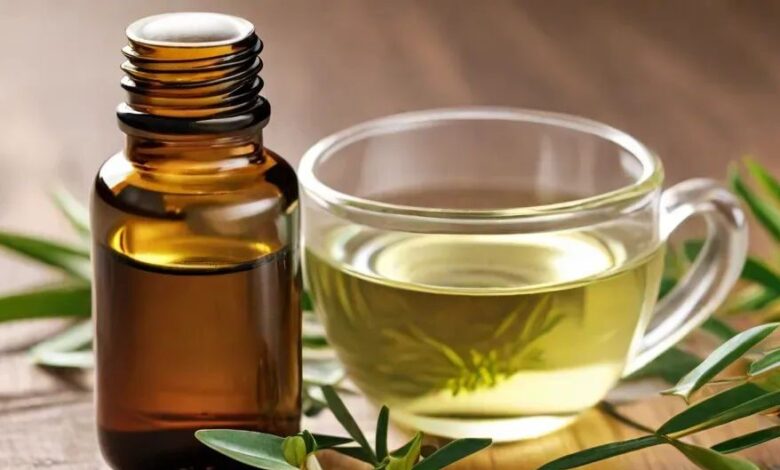
Unlocking the Power of Tea Tree Oil: 7 Incredible Benefits
Tea tree oil, derived from the leaves of the Australian tea tree (Melaleuca alternifolia), is a versatile essential oil that has gained immense popularity for its numerous benefits. Known for its antimicrobial activity, this potent oil has been used for centuries in traditional medicine to address various skin, hair, and health concerns.
Its natural properties make it an essential addition to any health kit, providing solutions that are both effective and safe. In this article, we will explore the incredible benefits of tea tree oil and how it can enhance your overall well-being.
What is Tea Tree Oil?
Origins and Extraction Process
Tea tree oil is an essential oil extracted from the leaves of the Melaleuca alternifolia, a plant native to Australia. The extraction process typically involves steam distillation, which preserves the oil’s potent compounds. The oil has been a staple in Australian traditional medicine and is renowned for its antifungal, antibacterial, and antiviral properties.
Many studies suggest that tea tree oil may help treat a variety of ailments, from skin irritations to respiratory issues. Its rich history and proven efficacy make it a valuable addition to any natural health regimen.
The origins of tea tree oil can be traced back to the indigenous people of Australia, who utilized the oil for its healing properties. They extracted the oil by crushing the leaves and inhaling the vapors or applying it topically for cuts and infections.
Today, the process has evolved, yet the essential oil retains its powerful activity due to its major components, including terpinen-4-ol, which is known for its antimicrobial effects. The oil’s versatility continues to be recognized globally, making it a sought-after natural remedy.
Why Tea Tree Oil is a Must-Have in Your Natural Health Kit
Including tea tree oil in your natural health kit is essential due to its broad spectrum of benefits. The oil is not only effective for treating skin conditions like acne and contact dermatitis but also serves as a potent disinfectant for household cleaning.
Its antimicrobial activity makes it a powerful agent against various pathogens, ensuring a healthier environment. Furthermore, the use of tea tree oil has been shown to enhance oral hygiene by combating plaque and gingivitis, proving its versatility in promoting overall health.
Moreover, tea tree oil is an essential oil that can be safely incorporated into your daily routine. Whether used in a topical solution, shampoo, or gel, it provides a natural alternative to chemical-laden products.
The benefits and risks associated with tea tree oil are well-documented, indicating that its proper use is generally safe for most individuals. By integrating this oil into your lifestyle, you can harness its potential to improve not just your skin and hair health, but also your overall well-being.
1. Tea Tree Oil for Skin Health: A Natural Solution for Acne and Irritations
How Tea Tree Oil Fights Acne and Pimples
Tea tree oil has been widely recognized for its effectiveness in treating acne and pimples due to its antibacterial properties. The oil penetrates deep into the skin, targeting the bacteria that cause acne while reducing inflammation and redness.
When applied topically, tea tree oil helps to unclog pores, preventing future breakouts. Many dermatologists recommend the use of tea tree oil as a natural alternative to harsh chemical treatments, as it minimizes the risk of irritation and promotes a clearer complexion.
In addition to its antibacterial attributes, tea tree oil may help regulate oil production, making it beneficial for those with oily skin types. Its application can soothe existing breakouts and diminish the appearance of scars over time.
Regular use of tea tree oil can lead to significant improvements in skin texture and clarity, allowing individuals to embrace their natural beauty confidently. The positive effects of tea tree oil on skin health continue to be supported by numerous clinical studies highlighting its role as a powerful ally against acne.
Eczema and Psoriasis: Soothing Inflammation and Reducing Redness
For individuals suffering from skin conditions like eczema and psoriasis, tea tree oil offers a natural solution to soothe inflammation and reduce redness. The oil’s anti-inflammatory properties work to calm irritated skin, providing relief from symptoms such as itching and dryness.
When diluted and applied topically, tea tree oil can significantly lessen flare-ups and improve overall skin texture. This makes it a valuable addition to any skincare routine for those dealing with chronic skin conditions.
Furthermore, tea tree oil’s ability to hydrate the skin while combating bacterial infections makes it especially beneficial for those experiencing skin irritation. Regular application can lead to a noticeable reduction in the severity of symptoms associated with eczema and psoriasis, allowing for more comfortable daily living.
By integrating tea tree oil into their skincare regimen, individuals can harness its natural healing properties to promote healthier skin and alleviate discomfort effectively.
Wound Healing: Preventing Infection and Accelerating Recovery
Tea tree oil is not only valuable for everyday skin issues; it also plays an essential role in wound healing. Its antimicrobial activity makes it an effective natural remedy for preventing infections in minor cuts and abrasions.
When applied topically, tea tree oil creates a protective barrier that helps to keep harmful bacteria at bay while promoting faster recovery. The oil’s soothing properties further aid in reducing inflammation, allowing the wound to heal more effectively.
Studies have shown that the application of tea tree oil can significantly enhance the healing process by accelerating tissue regeneration. By incorporating tea tree oil into your first-aid kit, you can ensure that you have a powerful ally for managing minor injuries.
Additionally, its natural origins provide peace of mind, as it offers a chemical-free alternative to traditional antiseptics. Overall, tea tree oil proves to be an invaluable asset for those seeking to promote optimal wound healing and protect their skin health.
2. Tea Tree Oil for Hair: Say Goodbye to Dandruff and Scalp Issues
Dandruff Treatment: How Tea Tree Oil Calms the Scalp and Prevents Flakes
Tea tree oil is an effective treatment for dandruff and other scalp issues, thanks to its antifungal properties. The oil helps to combat the fungus responsible for dandruff, soothing the scalp and alleviating itching.
By incorporating tea tree oil into your hair care routine, you can restore balance to your scalp and reduce the frequency of flaking. Many shampoos now contain tea tree oil as a key ingredient, making it easy to access its benefits for scalp health.
In addition to its antifungal activity, tea tree oil may help improve blood circulation to the scalp, promoting healthier hair growth. Regular use of tea tree oil shampoo can lead to a noticeable reduction in dandruff and an overall improvement in scalp condition.
The refreshing scent of tea tree oil also adds a pleasant aroma to your hair care routine. With its proven effectiveness, tea tree oil has become a go-to solution for those seeking a natural remedy for dandruff and scalp irritation.
Promoting Hair Growth by Unclogging Hair Follicles
Beyond dandruff treatment, tea tree oil can also promote hair growth by unclogging hair follicles. The oil penetrates the scalp, removing excess sebum and product buildup that can hinder hair growth.
By keeping hair follicles clear, tea tree oil creates an optimal environment for hair to thrive. Many individuals have reported improvements in hair density and strength when incorporating tea tree oil into their hair care routines.
The nourishing properties of tea tree oil extend beyond just cleansing; it also provides essential nutrients to hair strands, enhancing overall hair health. Regular application of tea tree oil may help prevent hair thinning and promote a fuller, thicker appearance.
As a natural solution, tea tree oil stands out as an excellent alternative to chemical-laden hair products, making it an essential component of effective hair care.
3. Tea Tree Oil for Oral Health: Freshen Breath and Promote Gum Health
Fighting Plaque and Gingivitis: How Tea Tree Oil Enhances Oral Hygiene
Tea tree oil is an excellent addition to your oral hygiene routine due to its antibacterial properties. The oil has been shown to fight plaque buildup and reduce the risk of gingivitis. By incorporating tea tree oil into your dental care regimen, you can effectively enhance your overall oral health.
Many toothpaste and mouthwash products now contain tea tree oil as a primary ingredient, allowing individuals to enjoy its benefits with everyday use.
When used in a diluted solution, tea tree oil can effectively combat harmful bacteria in the mouth, promoting healthier gums and fresher breath. Its natural antiseptic qualities help to eliminate odor-causing bacteria, resulting in a cleaner, more refreshing oral environment.
Regular use of tea tree oil can lead to improved gum health and a noticeable reduction in dental issues, making it a must-have for anyone looking to enhance their oral hygiene naturally.
Fresh Breath: The Antibacterial Action of Tea Tree Oil
The antibacterial action of tea tree oil is particularly beneficial for achieving fresh breath. This essential oil targets the bacteria that cause bad breath, providing a natural remedy that is both effective and safe.
In addition to using tea tree oil in dental products, you can create your own mouth rinse by diluting the oil with water for a refreshing experience. This simple addition to your oral care routine can help maintain a healthy, pleasant-smelling mouth.
Furthermore, tea tree oil’s natural properties extend beyond just breath freshness; it contributes to overall oral health by reducing the risk of infections and promoting gum healing. As part of a comprehensive oral hygiene regimen, tea tree oil can work wonders in ensuring a clean and healthy mouth. Embracing this natural solution can lead to long-lasting benefits for your dental health and overall confidence.
4. Natural Deodorant: Tea Tree Oil’s Role in Neutralizing Odor
Bacteria-Free Body: How Tea Tree Oil Fights Body Odor Naturally
Tea tree oil serves as a natural deodorant by combating the bacteria responsible for body odor. Its antimicrobial activity effectively neutralizes odor-causing bacteria, making it an excellent alternative to conventional deodorants.
By applying tea tree oil to areas prone to sweating, you can enjoy a fresh, clean scent throughout the day. Many natural deodorant formulations now include tea tree oil as a key ingredient, highlighting its effectiveness in odor control.
In addition to its deodorizing properties, tea tree oil helps to maintain healthy skin by reducing inflammation and irritation. Using tea tree oil in your personal care routine allows you to embrace a chemical-free approach to body odor management.
Its natural scent is both refreshing and uplifting, providing a pleasant experience while keeping you odor-free. By incorporating tea tree oil into your daily hygiene routine, you can enjoy the benefits of a bacteria-free body.
Incorporating Tea Tree Oil into Your Daily Hygiene Routine
Incorporating tea tree oil into your daily hygiene routine is simple and effective. You can add a few drops of tea tree oil to your regular shampoo or body wash to enhance its antibacterial properties.
Additionally, creating a homemade deodorant using a blend of tea tree oil and carrier oils can provide a natural and effective solution for odor control. The versatility of tea tree oil allows it to seamlessly fit into various personal care products, enhancing their effectiveness.
To maximize the benefits of tea tree oil, consider using it in combination with other natural ingredients such as coconut oil or baking soda for added effectiveness. The incorporation of tea tree oil into your hygiene routine not only promotes cleanliness but also supports overall skin health.
By making this simple adjustment, you can transform your daily routine into a holistic wellness experience that embraces the power of natural ingredients.
5. Household Benefits of Tea Tree Oil: A Powerful Natural Cleaner
Disinfecting Surfaces: Killing Bacteria and Fungi Without Harsh Chemicals
Tea tree oil is an excellent natural cleaner, capable of disinfecting surfaces without the need for harsh chemicals. Its antifungal and antibacterial properties make it effective for killing bacteria and fungi, ensuring a clean environment.
By adding tea tree oil to your cleaning regimen, you can create a powerful disinfectant solution that is safe for use around your family and pets. This natural alternative not only maintains cleanliness but also promotes health in your living space.
Using tea tree oil for cleaning is easy; simply mix a few drops with water in a spray bottle for a DIY disinfectant. You can use this solution on countertops, cutting boards, and bathroom surfaces to eliminate germs and pathogens.
The pleasant scent of tea tree oil leaves your home smelling fresh while ensuring that harmful bacteria are eradicated. Embracing tea tree oil as a cleaning agent allows you to maintain a healthy environment without compromising on safety.
Mold and Mildew Prevention: Tea Tree Oil for Clean and Healthy Living Spaces
Tea tree oil is also effective for preventing mold and mildew growth in your home. Its antifungal properties help to inhibit the development of mold spores, ensuring that your living spaces remain clean and healthy.
By adding tea tree oil to your cleaning solutions, you can effectively combat mold and mildew in areas such as bathrooms and kitchens. This natural approach not only protects your home but also contributes to better indoor air quality.
To prevent mold growth, you can create a tea tree oil spray by mixing the oil with water and applying it to susceptible areas. Regular use of this solution can significantly reduce the risk of mold and mildew infestations.
By incorporating tea tree oil into your household cleaning routine, you can enjoy a healthier living environment while embracing the power of natural ingredients. This proactive approach ensures that your home remains a safe haven for you and your loved ones.
6. Tea Tree Oil as an Insect Repellent: Natural Protection Against Pests
Repelling Mosquitoes, Flies, and Bugs: The Power of Tea Tree Oil
Tea tree oil serves as a powerful natural insect repellent, effectively repelling mosquitoes, flies, and other bugs. Its strong scent acts as a deterrent, keeping pests at bay while allowing you to enjoy the outdoors without the worry of bites.
Many commercial insect repellents now include tea tree oil as a key ingredient, highlighting its effectiveness in providing natural protection. This makes tea tree oil an excellent alternative to chemical-laden repellents.
In addition to repelling insects, tea tree oil can also soothe bug bites and alleviate itching. If you do happen to get bitten, applying diluted tea tree oil can help reduce inflammation and discomfort. By incorporating tea tree oil into your outdoor activities, you can enjoy nature while keeping harmful pests at bay.
Its natural properties ensure that you are protected without exposing yourself to harsh chemicals, making it a smart choice for outdoor enthusiasts and families alike.
How to Use Tea Tree Oil as an Insect Repellent at Home and Outdoors
Using tea tree oil as an insect repellent is simple and effective. You can create a DIY repellent by mixing a few drops of tea tree oil with water in a spray bottle. This solution can be sprayed around your home or applied to your skin before heading outdoors.
Additionally, tea tree oil can be added to candles or diffusers to create a pest-repelling atmosphere in your home. This versatile application allows you to enjoy the benefits of tea tree oil in various settings.
For enhanced effectiveness, consider combining tea tree oil with other natural repellents such as eucalyptus oil or citronella. This blend can provide an extra layer of protection against a wider range of insects.
Whether you’re at home or out in nature, incorporating tea tree oil into your pest control strategy ensures that you can enjoy your surroundings without the annoyance of insects. By embracing this natural solution, you can maintain a pest-free environment while prioritizing your health and safety.
7. Tea Tree Oil for Nail and Foot Care: Strengthen, Treat, and Prevent Infections
Fungal Nail Treatment: How Tea Tree Oil Helps Combat Nail Fungus
Tea tree oil is renowned for its effectiveness in treating fungal nail infections, commonly known as onychomycosis. The oil’s antifungal properties work to combat the fungus responsible for nail infections, promoting healthier nails.
When applied topically, tea tree oil can penetrate the nail bed and surrounding skin, helping to eliminate the infection and prevent its return. Many individuals have found success in using tea tree oil as part of their nail care routine.
In addition to treating existing fungal infections, tea tree oil can also be used as a preventive measure. Regular application can help strengthen nails and keep them free from harmful fungi. Its natural properties make it an excellent alternative to chemical treatments, which may cause irritation or damage.
By incorporating tea tree oil into your nail care regimen, you can maintain healthy, strong nails and reduce the risk of infections effectively.
Foot Care: Tea Tree Oil for Odor-Free Feet and Healthy Toenails
Tea tree oil is a valuable asset for foot care, effectively combating odor and promoting healthy toenails. Its antifungal and antibacterial properties help to eliminate odor-causing bacteria, ensuring that your feet remain fresh throughout the day.
When used in foot soaks or diluted foot sprays, tea tree oil can provide soothing relief for tired feet while addressing common foot concerns like athlete’s foot.
In addition to controlling odor, tea tree oil can also help maintain the health of your toenails. Regular application can prevent fungal infections and keep your nails looking their best.
By incorporating tea tree oil into your foot care routine, you can enjoy the benefits of fresher, healthier feet. This simple addition can enhance your overall foot health and provide the comfort and confidence you deserve.
How to Use Tea Tree Oil Safely and Effectively
Using tea tree oil safely and effectively requires some knowledge of its properties and application methods. It is crucial to dilute tea tree oil with a carrier oil before applying it directly to the skin, as undiluted oil can cause irritation or allergic reactions.
A common dilution ratio is one part tea tree oil to three parts carrier oil, such as coconut or jojoba oil. Always perform a patch test before using tea tree oil on larger areas to ensure that it does not cause skin irritation.
Additionally, it’s essential to keep tea tree oil away from sensitive areas, such as the eyes and mucous membranes, to avoid adverse reactions. For oral use, tea tree oil should only be used in diluted forms as part of toothpaste or mouthwash products.
Ingestion of tea tree oil can lead to oil poisoning, so it should never be consumed. By following these guidelines, you can safely enjoy the many benefits of tea tree oil for skin, hair, and health.
Conclusion: Embrace the Natural Power of Tea Tree Oil
In conclusion, embracing the natural power of tea tree oil can enhance your wellness routine. Australian tea tree oil, or oil of melaleuca, exhibits remarkable antimicrobial activity against conditions like acne vulgaris and head lice, as evidenced by a systematic review and controlled trials of topical tea tree oil products.
Products containing tea tree essential oil demonstrate a significant antibacterial effect of tea tree while reducing inflammation. However, users should be aware of potential adverse effects, such as contact dermatitis from tea tree oil. Utilizing formulations like tea tree oil gel or oil mouthwash can maximize benefits.
















